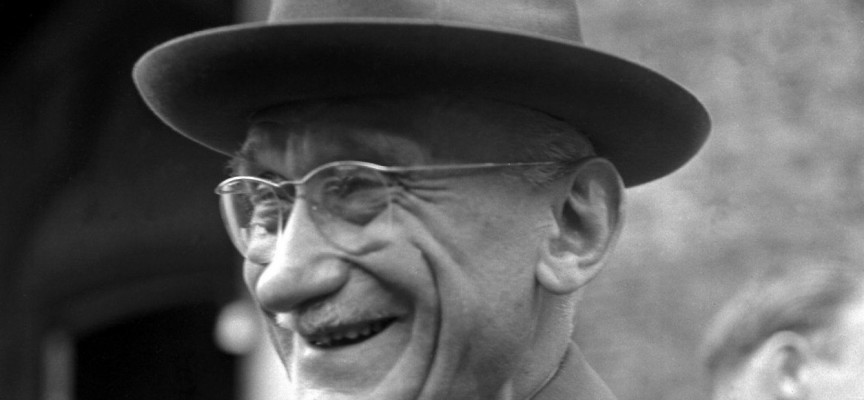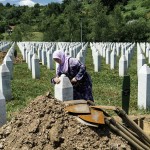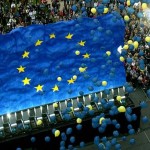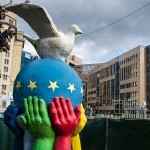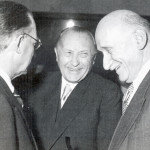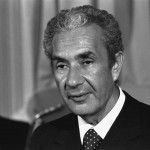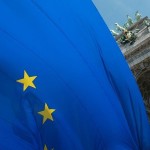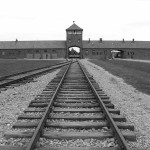May 9th the “Europe Day” will be celebrated throughout Europe. This date was chosen because the historians let from this day start the process of European integration that should lead to the political unity of Europe.
On 9th May, 1950, in front of a large audience of journalists, Foreign Minister Robert Schuman declared that France and Germany had agreed to pool under the supervision of a high supranational authority, their common production of coal and steel, of which their territory was rich. The possession of these mining areas had been the occasion of three wars: the Franco-Prussian War, which ended in 1871, and two World Wars (1914-1918 and 1939-1945). Iron and coal were at that time raw materials for the war industry.
Schuman’s idea, suggested to him by Jean Monnet, was bold because the pooling of coal and iron took away one of the causes that had led Europe to three bloody wars, and because for the first time in history the representative of a winner country, France, held out his hand to the defeated enemy, Germany. From the Franco-German reconciliation was born the first European community, the Ceca (European Coal and Steel Community), the seed from which will be born first the European Community and subsequently, through intermediate stages, today’s European Union. Italy, Belgium, the Netherlands and Luxembourg, as well as Germany, adhered to Schuman’s plea: the Europe “of the six” was born.
Schuman did not want to unite nations in a coalition, but to unite peoples in a same destiny. Peace in Europe was his highest aspiration. He wanted to reach it through “small steps”: uniting countries first in an economic community and subsequently in the monetary and political one. All in the spirit of solidarity among nations.
He left written: “Before being an economic entity, Europe is a cultural and spiritual community, which owes its existence to Christianity, the soul of its history. The political unity of the continent is not the negation of one’s homeland, but the necessary completion to economic integration. It prefigures national solidarity”.
His act was not the result of diplomatic cunning, but he derived it from the inner strength nourished by daily participation in the Eucharist, by the reflection on God’s Word, by a mature Marian devotion, by prayer.
His faith in the Lord led him to love his neighbour: he was “of kind and gentle heart,” extremely modest, an example of honesty.
From 1920 to 1962 (except for the period of the Nazi occupation) he was elected to the French Assembly for a constituency of Lorraine. He was Finance Minister, Prime Minister, Foreign Minister, Minister of Justice, first President of the European Parliament. In the political commitment, he considered himself as “an imperfect instrument of Providence who uses us to accomplish its great designs that go beyond our weak forces” – so he wrote to his Chief of staff. Politics was for Schuman a means to serve mankind and to promote common good.
”The Father of Europe” – as the European Parliament called him – was of Luxembourg by birth, German by adoption, and French by nationality. He spoke four languages properly, he was not afraid to accept and rework the Germanic culture and the French one. To maintain this dual character of its culture he deepened the Christian dimension, aware that individualism and post-Enlightenment rationalism had weakened social bonds and solidarity among men.
In today’s Europe, in which relations have become fragile, in which the primacy of man is silenced by an economy that chases the free market and consumerism, where borders rise again and walls that seemed to have disappeared forever are raised again, in which politics goes beyond its limits and promises what it cannot keep, Schuman is an example for Christians of how politics can be a means to exercise their vocation to holiness and a life model for everyone.
The saints are not supermen, but those who live their days according to the teachings of the Gospel and witnessing it with good works. Even politicians can become saints “wearing plain clothes and hiding gems in their chest” (quote by a Chinese Taoist Master).
For Robert Schuman, father of Europe, the beatification process at the Congregation of Saints is underway for having heroically practiced the theological and cardinal virtues. Let us ask the Lord of history, also through Schuman’s intercession, that, in this difficult time for Europe, he makes us rediscover the reasons for hope that paradoxically lurk in the reasons for despair.
Il 9 maggio si celebrerà in tutta Europa la “festa dell’Europa”. È stata scelta questa data perché gli storici fanno iniziare da questo giorno il processo d’integrazione europea che dovrà portare all’unità politica.
Il 9 maggio 1950, davanti a una nutrita platea di giornalisti, il ministro degli esteri Robert Schuman dichiarava che Francia e Germania avevano concordato di mettere in comune, sotto la vigilanza di un’alta autorità sovranazionale, le comuni produzioni di carbone e di acciaio, delle quali era ricco il loro territorio. Il possesso di questi bacini minerari era stato l’occasione di tre guerre: la franco-prussiana, conclusasi nel 1871, e le due guerre mondiali (1914-1918 e 1939-1945). Ferro e carbone erano, a quel tempo, materie prime per l’industria bellica.
L’idea di Schuman, suggeritagli da Jean Monnet, era audace perché con la messa in comune di ferro e carbone si toglieva di mezzo una delle cause che avevano portato l’Europa a tre cruenti guerre e perché per la prima volta nella storia il rappresentante di un paese vincitore, la Francia, tendeva la mano al nemico vinto, la Germania. Dalla riconciliazione franco-tedesca nasceva la prima comunità europea, la Ceca (Comunità europea del carbone e dell’acciaio), germe da cui nasceranno dapprima la Comunità Europea e successivamente, attraverso tappe intermedie, l’odierna Unione Europea. All’appello di Schuman aderirono, oltre la Germania, l’Italia, il Belgio, i Paesi Bassi e il Lussemburgo: nasceva l’Europa “dei sei”.
Schuman non voleva coalizzare delle nazioni, ma unire i popoli in un medesimo destino. La pace in Europa era la sua alta aspirazione. Voleva raggiungerla attraverso “piccoli passi”: unire paesi dapprima in una comunità economica e, successivamente, in quella monetaria e politica. Il tutto nel segno della solidarietà fra le nazioni.
Ha lasciato scritto: “Prima di essere un’entità economica, l’Europa è una comunità culturale e spirituale, che deve la sua esistenza al cristianesimo, anima della sua storia. L’unità politica del continente non è la negazione della Patria, ma il completamento necessario all’integrazione economica. Essa prefigura la solidarietà nazionale”.
Il suo atto non era frutto di scaltrezza diplomatica, ma gli derivava dalla forza interiore alimentata dalla partecipazione quotidiana all’Eucarestia, dalla riflessione sulla Parola di Dio, da una virile devozione mariana, dalla preghiera.
La sua fede nel Signore lo portava ad amare il prossimo: era “dolce e mite di cuore”, modestissimo, esempio di onestà.
Dal 1920 al 1962 (salvo il periodo dell’occupazione nazista) fu eletto deputato all’Assemblea francese per una circoscrizione della Lorena. Fu ministro delle Finanze, presidente del Consiglio, ministro degli Esteri, ministro della Giustizia, primo presidente del Parlamento europeo. Nell’impegno politico si considerava come “uno strumento imperfetto della Provvidenza che si serve di noi per compiere i Suoi grandi disegni che oltrepassano le nostre deboli forze” – così scriveva al suo capo di gabinetto. La politica era per Schuman un mezzo per servire l’uomo e per promuovere il bene comune.
“Il padre dell’Europa” – come lo chiamò il Parlamento europeo – era lussemburghese per nascita, germanico per adozione, francese per nazionalità. Parlava correttamente quattro lingue, non aveva timore di accogliere e rielaborare la cultura germanica e quella francese. Per conservare questo duplice carattere della sua cultura approfondì la dimensione cristiana, consapevole che l’individualismo e il razionalismo post-illuministico avevano indebolito i legami sociali e la solidarietà tra gli uomini.
Nell’Europa d’oggi, in cui le relazioni sono divenute fragili, in cui il primato dell’uomo è soffocato da un’economia che rincorre il libero mercato e il consumismo, in cui sono risorte frontiere e vengono innalzati muri che sembravano scomparsi per sempre, in cui la politica oltrepassa i propri limiti e promette ciò che non può mantenere, Schuman è un esempio per i cristiani di come la politica possa essere un mezzo per esercitare la propria vocazione alla santità e un modello di vita per tutti.
I santi non sono dei superuomini, ma coloro che vivono i loro giorni secondo gli insegnamenti del Vangelo, testimoniandolo con le opere buone. Anche i politici possono divenire santi “indossando abiti civili e nascondendo gemme nel loro petto” (aforisma di un maestro taoista cinese).
Per Robert Schuman, padre dell’Europa, è in corso presso la Congregazione vaticana per le cause dei santi il processo di beatificazione per aver egli praticato eroicamente le virtù teologali e cardinali. Chiediamo al Signore della Storia, per intercessione anche di Schuman, che, in questo momento difficile per l’Europa, ci faccia riscoprire le ragioni della speranza che paradossalmente si annidano nelle ragioni della disperazione.
Edoardo Zin
Latest posts by Edoardo Zin (see all)
- 60° Treaties of Rome: a Europe that struggles and hopes - 19 marzo 2017
- Europe lacks the great politics - 28 dicembre 2016
- The strength of Robert Schuman - 30 aprile 2016

